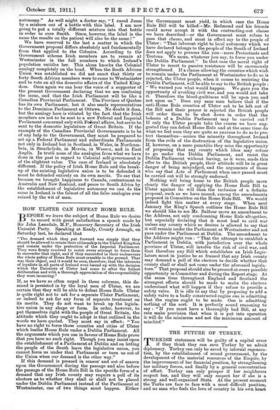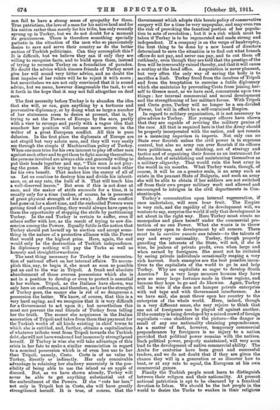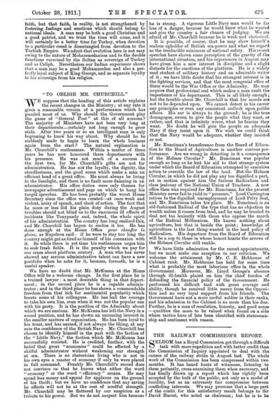THE FUTURE OF TURKEY.
TURKISH statesmen will be guilty of a capital error if they think they can save Turkey by an adroit diplomacy. Turkey can only be saved by internal regenera- tion, by the establishment of sound government, by the development of the material resources of the Empire, by the improvement of her financial position, by strengthening her military forces, and finally by a general concentration of effort. Turkey can only prosper if her neighbours respect her, and they will only respect her if she is a strong and well-organized State. At the present moment the Turks are face to face with a most difficult position, and no man who feels the love of country in his own heart can fail to have a strong sense of sympathy for them. True patriotism, the love of a man for his native land and for his nation rather than merely for his tribe, has only recently sprung up in Turkey, but we do not doubt fur a. moment its genuineness. There is therefore something specially pathetic in the situation of the men who so passionately desire to save and serve their country as do the better section of Turkish politicians. Can they accomplish this P It is difficult, but we believe they can if only they are willing to recognize facts, and to build upon them, instead of trying to recreate Turkey on a foundation of paradox. No doubt the advice which sincere friends of Turkey must give her will sound very bitter advice, and no doubt the first impulse of her rulers will be to reject it with scorn ; but nevertheless we are not only convinced that it is sound advice, but we mean, however disagreeable the task, to set it forth in the hope that it may not fall altogether on deaf ears.
The first necessity before Turkey is to abandon the idea that she will, or can, gain anything by a tortuous and provocative diplomacy, or by doing what so large a number of her statesmen seem to desire at present, that is, by trying to set the Powers of Europe by the ears, partly with a view to revenge and partly with a vague idea that somehow her position will become more secure in the welter of a great European conflict. All this is pure delusion. In the first place the diplomats of Europe are not stupid but very astute men, and they will very easily see through the simple if Machiavellian policy of Turkey. When one man tries for his own interest to play off other men against each other and to get them to fight among themselves, the persons involved are always able and generally willing to put their heads together and say, " This man is not play- ing the game. He is trying to make us wound each other for his own benefit. That makes him the enemy of all of us. Let us combine to destroy him and divide his inherit- ance, or, at any rate, the bulk of it. That will teach him a well-deserved lesson." But even if this is not done at once, and the maker of strife succeeds for a time, it is usually only for a time (unless, of course, he is possessed of great physical strength of his own). After the conflict had gone on for a short time, and the embroiled Powers were getting tired of quarrelling, they would always have open to them the opportunity of stopping the strife by partitioning Turkey. In the end Turkey is certain to suffer, even if others suffer with her, as the result of trying to sow dis- sension among the Powers. Equally futile is the notion that Turkey should put herself up to auction and accept some- thing in the nature of a protective alliance with the Power that would pay the highest price. Here, again, the end would only be the destruction of Turkish independence. In diplomacy nothing will pay the Turks so well as honesty and straightforwardness.
The next thing necessary for Turkey is the concentra- tion of national effort on her internal affairs. To accom- plish this, nay, to begin it, she must as soon as possible put an end to the war in Tripoli. A frank and absolute abandonment of those oversea possessions which she is not in a position to develop or even to protect is essential to her welfare. Tripoli, as the Italians have shown, was only hers on sufferance, and therefore, as far as the strength of Turkey goes, the sooner she is rid of so dangerous a possession the better. We know, of course, that this is a very hard saying, and we recognize that it is very difficult for a Government to act upon it ; but nevertheless this must not prevent the real friends of Turkey from telling her the truth. The sooner she acquiesces in the Italian annexation of Tripoli and takes from them that payment for the Turkish works of all kinds existing in chief towns to which she is entitled, and, further, obtains a capitalization of whatever tribute went from Tripoli towards the Turkish debt, she will not have weakened but immensely strengtlyned herself. If Turkey is wise she will take advantage of this crisis in her fate to make a similar renunciation in regard to a nominal possession which is of even less use to her than Tripoli, namely, Crete. Crete is of no value to Turkey, directly or indirectly. Her only conceivable advantage in retaining her shadowy suzerainty is the pos- sibility of being able to use the island as an apple of discord. But, as we have shown already, Turkey will never be able to get anything substantial out of the embroilment of the Powers. If she " cuts her loss," not only in Tripoli but in Crete, she will have greatly strengthened herself. It is true, of course, that the Government which adopts this heroic policy of conservative surgery will for a time be very unpopular, and may even run the risk of provoking the fanatical portion of her popula- tion to acts of revolution ; but it is a risk which must be taken if Turkey is to be regenerated and made strong and independent. If a company is on the verge of bankruptcy, the first thing to be done by a new board of directors determined to save the situation is to find out what branch offices do not pay, and never can pay, and to cut them off ruthlessly, even though they are told that the prestige of the firm will be irrevocably ruined thereby, and that it will cause a mutiny at the head office. Amputation is never pleasant, but very often the only way of saving the body is to sacrifice a limb. Turkey freed from the incubus of Tripoli and from the temptation to exercise a futile diplomacy which she maintains by preventing Crete from joining her- self to Greece must, as we have said, concentrate upon two things : her internal commercial and moral development and the strengthening of her military forces. With Tripoli and Crete gone, Turkey will no longer be a sea-divided Power, but will in effect be a self-contained Empire.
In regard to military organization, it is not necessary to give advice to Turkey. Her younger officers have shown that they are capable of reviving the military genius of the race. All that is required here is that the Army should be properly incorporated with the nation, and not remain as a menacing imperium in iniperio. Not only can no State ever flourish unless the civil power is in supreme control, but also no army can ever flourish if its officers turn politicians, and are thinking, not of strategy and tactics and of organizing their forces as an instrument for defence, but of establishing and maintaining themselves as a military oligarchy. That would ruin the best army in the world in six months. What Turkey wants, though, of course, it will be on a greater scale, is an army such as exists in the peasant State of Bulgaria, and such an army she will be able to obtain if her soldiers are not switched off from their own proper military work and allowed and encouraged to intrigue in the civil departments in Con- stantinople. Turkey's concentration upon internal regeneration, if once undertaken, will soon bear fruit. The Empire is very rich, and the rapidity of its development will, we venture to say, surprise the world if only that development is set about in the right way. Here Turkey must create no monopolies and place herself under the commercial pro- tection of no one Power. What she wants is to throw her country open to development by all corners. There must be la carriere ouverte aux talents—to the talents of any and every nationality. Turkey, though properly guarding the interests of the State, will not, if she is wise, be jealous of private profit, even when large and when earned by foreigners. She must not be irritated by seeing private individuals occasionally reaping a very rich harvest. Such examples are the best possible incen- tives to the capitalists of the world to go in and help Turkey. Why are capitalists so eager to develop South America ? In a very large measure because they have seen so many large fortunes made in those regions, and because they hope to go and do likewise. Again, Turkey will be wise if she does not hamper private enterprise with red tape and with Government interference. As we have said, she must throw open her country to the enterprise of the whole world. Here, indeed, though in a very different sense, she may rejoice to think that one set of foreigners can be played off against another. If the country is being developed by a mixed crowd of foreign capitalists —one shudders at the picture—the danger is small of any one nationality obtaining preponderance.
As a matter of fact, however, temporary commercial preponderance by foreigners is no injury to a nation provided that political power remains with the natives. Such political power, properly maintained, will very soon lead to the development of native commercial ability. The Arabs for centuries have been great and successful traders, and we do not doubt that if they are given the chance they will in a generation or so discover how to beat, or at any rate to equal, the European at his own commercial games.
Finally the Turkish people must learn to distinguish between their religion and their nationality. At present national patriotism is apt to be obscured by a fanatical devotion to Islam. We should be the last people in the world to desire the Turks to weaken in their religiong faith, but that faith, in reality, is not strengthened by fostering feelings and emotions which should belong to national ideals. A man may be both a good Christian and a good patriot, and we trust the time will come, and it will certainly be a better time for Turkey, when devotion to a particular creed is disentangled. from devotion to the Turkish Empire. We admit that evolution here is not easy owing to the nature of Mohammedanism and to the double functions exercised by the Sultan as sovereign of Turkey and as Caliph. Nevertheless our Indian experience shows that a man may be a good Mohammedan and also a per- fectly loyal subject of King George, and so separate loyalty to his sovereign from his religion.












































 Previous page
Previous page